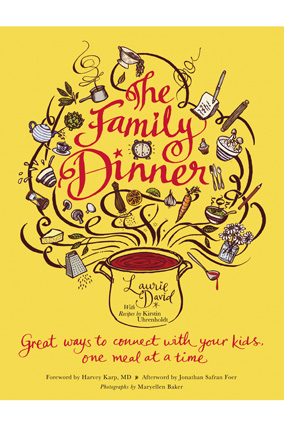3 Fun Ways to Avoid the Silent Dinner Table

Photo: Courtesy of Grand Central Publishing
No more "How was your day?" ... "Fine," followed by silence. These games, from Laurie David's new book, The Family Dinner, will get your family talking, guaranteed.
When playing a new word game, you want everyone to participate and not feel like they are going to be judged, ridiculed, or teased (so no judging, ridiculing, or teasing). Toss some easy words to the kids at the table who might need extra encouragement. Ask direct questions; call on people by name. Be the leader. Another tip: Know your crowd. Not every word game works for every group. What my teenager will play now at the table has shifted since she hit the oh-so-pleasant "I refuse to cooperate" age of fifteen. Younger kids are generally game for everything and will amaze you with how quickly they catch on.
Pet Peeves and Idiosyncrasies
Pet Peeves and Idiosyncrasies is a favorite game at the David household; we never get tired of playing it (perhaps because we have so many of both!). It's also a great ice-breaker with new guests.
First of all, pet peeves and idiosyncrasies are very different. It's fun to have your family debate the subtle difference. Ask each person to name a pet peeve and one of their idiosyncrasies (you can do them as separate rounds, together, or one-a-night). My daughter Romy wants me to include her pet peeve here but I hope it won't confuse you because this one actually crosses the line between the two: She doesn't like it when people make dents in their pile of ketchup on their plate. If they dip a fry in it, she feels they should smooth it out afterward to get rid of the holes. I will let you decide that one, but feel free to challenge respondents if you think a pet peeve is really an idiosyncrasy. Our friend Bella's pet peeve is dogs that lick her face. What is yours?
Addendum: If your family has a good sense of humor and they aren't sensitive types, you could also play a version of this game where you name one another's idiosyncrasies and pet peeves (believe me, they know more of your quirks than you do!). Of course, this version is for advanced (thick-skinned) players only.

Photo: Courtesy of Grand Central Publishing
What I Know About You or What I Like About You
There are two ways to play this one. You can pick one featured person at the table, and have everyone tell one thing they know about him or her. Then you pick the next person. Or you can answer the question based on who is sitting next to you so that each person is passing the ball to the person to the left or right. If you want, you can use a spoon, or the saltshaker, or any fun item that you can pass around to the next speaker. This will help little ones keep track of whose turn it is and build excitement for the moment that spoon is in their little hands. For example, I am sitting next to Cazzie who is sitting next to Bella who is sitting next to Alex who is sitting next to Ben.
I start by saying, "I know that Cazzie got high scores on her world civ exam." I pass the spoon to Cazzie, and she looks at Bella and says, "I know that Bella got stung by a bee yesterday and didn't even cry." Cazzie passes the spoon to Bella, who looks at Alex and says, "I know that Alex loves Legos," and so on. Your kids learn to listen to one another without interrupting, to patiently wait for their turn, to come up with positive things to say about one another, and to make the most of their moment in the sun.
Start clockwise (explain what that means) and then reverse it (counterclockwise—teach them that, too). If the game is working and you want to do a bonus round, have the leader pick someone from the table in their head and say something they know about the person. The group has to guess who they are talking about.
I Never
This is a game of elimination; your five fingers are the only equipment necessary. Go around the table and say something you have never done. For example, I have never eaten a tomato. If anyone else at the table has eaten a tomato, they raise one finger. The next person goes... "I never watched an episode of M*A*S*H." Your statements need to be truthful and reasonable (for example, if you are a guy, you can't say, "I never had a baby"). When all five fingers are raised, you are out. The object is to come up with enough common things that you've never done but others surely have and by doing so you knock others out. The person with the fewest fingers raised wins. This game will be frequently interrupted by requests for explanations, stories, and so on.
Laurie David's been-through-it strategies for keeping your family together...one meal at a time
Excerpted from The Family Dinner by Laurie David. Copyright © 2010 by Hybrid Nation, Inc. Used by arrangement with Grand Central Publishing. All rights reserved.
Fun with Your Family
Outdoor adventures your kids will love
How to turn off the TV and tune into your children
8 recipes you can make with your kids
There are two ways to play this one. You can pick one featured person at the table, and have everyone tell one thing they know about him or her. Then you pick the next person. Or you can answer the question based on who is sitting next to you so that each person is passing the ball to the person to the left or right. If you want, you can use a spoon, or the saltshaker, or any fun item that you can pass around to the next speaker. This will help little ones keep track of whose turn it is and build excitement for the moment that spoon is in their little hands. For example, I am sitting next to Cazzie who is sitting next to Bella who is sitting next to Alex who is sitting next to Ben.
I start by saying, "I know that Cazzie got high scores on her world civ exam." I pass the spoon to Cazzie, and she looks at Bella and says, "I know that Bella got stung by a bee yesterday and didn't even cry." Cazzie passes the spoon to Bella, who looks at Alex and says, "I know that Alex loves Legos," and so on. Your kids learn to listen to one another without interrupting, to patiently wait for their turn, to come up with positive things to say about one another, and to make the most of their moment in the sun.
Start clockwise (explain what that means) and then reverse it (counterclockwise—teach them that, too). If the game is working and you want to do a bonus round, have the leader pick someone from the table in their head and say something they know about the person. The group has to guess who they are talking about.
I Never
This is a game of elimination; your five fingers are the only equipment necessary. Go around the table and say something you have never done. For example, I have never eaten a tomato. If anyone else at the table has eaten a tomato, they raise one finger. The next person goes... "I never watched an episode of M*A*S*H." Your statements need to be truthful and reasonable (for example, if you are a guy, you can't say, "I never had a baby"). When all five fingers are raised, you are out. The object is to come up with enough common things that you've never done but others surely have and by doing so you knock others out. The person with the fewest fingers raised wins. This game will be frequently interrupted by requests for explanations, stories, and so on.
Laurie David's been-through-it strategies for keeping your family together...one meal at a time
Excerpted from The Family Dinner by Laurie David. Copyright © 2010 by Hybrid Nation, Inc. Used by arrangement with Grand Central Publishing. All rights reserved.
Fun with Your Family
Outdoor adventures your kids will love
How to turn off the TV and tune into your children
8 recipes you can make with your kids



